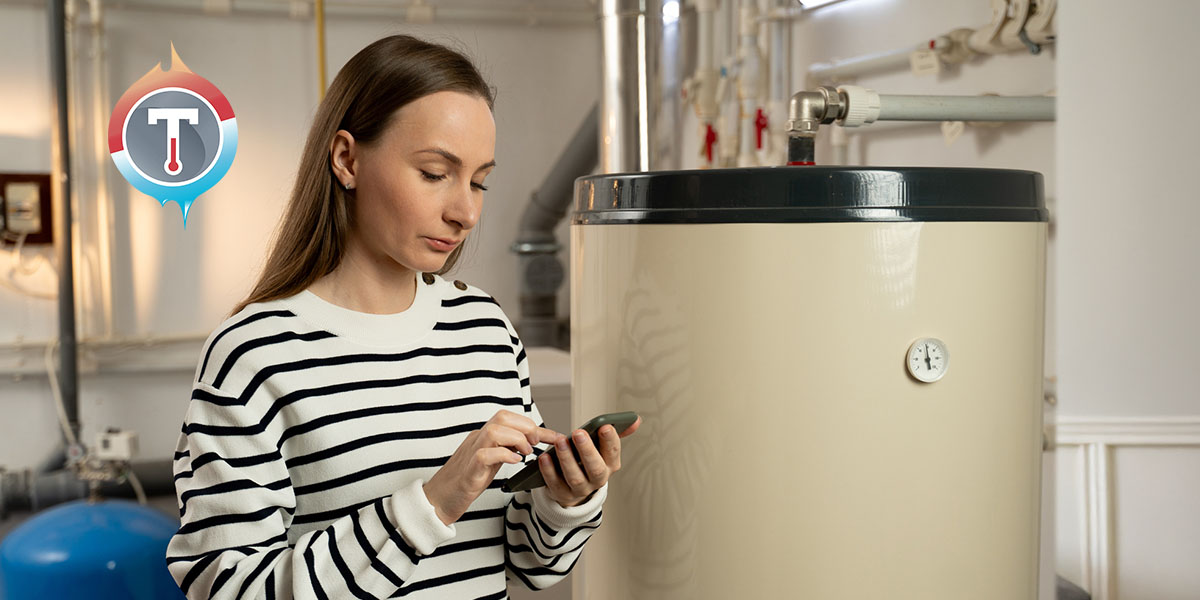
Your water heater may be malfunctioning for various reasons, from a broken heating element to sediment buildup. Knowing why your water heater isn’t working can help you find a solution and return to your routine.
Learn what’s causing an issue and what you can do to enjoy hot water again.
A Circuit Breaker Trip
One of the most common water heater issues is having no hot water in the house. Check the power supply first if you’ve turned the faucet on and are not getting hot water. Turning the system back on will look different depending on whether you have an electric or gas water heater:
- Electric water heater: Locate the breaker box, which may be in the basement, laundry room or garage. A water heater switch facing down may have caused the appliance to switch off. Switch it back on again, and your water heater should start warming the water.
- Gas water heater: First, ensure you have a steady gas supply. If this isn’t the issue, check if the pilot light is on. If not, the water supply lines may be frozen and need to be thawed. Alternatively, follow the manufacturer’s guidelines to relight it. If the light is on but the water isn’t heating, it may be a bigger system issue.
Interrupted Gas Supply
If you have a gas water heater that’s not warming the water, the gas supply could be interrupted. Without sufficient gas, the system cannot heat your water. You can test it by switching on any other appliance, like the stove. If it doesn’t switch on, you may have a gas supply problem. If it does, the issue is isolated to the water heater.

Thermostat Issues
The thermostat helps you control the water’s temperature. When faulty, the system can make the water too hot or lukewarm. Locate and reset the thermostat, and the water heater should start warming the water. If the water’s still cold, check the set temperature. Resetting the thermostat and raising the set temperature should solve the problem, but you may be dealing with a different thermostat malfunction if it doesn’t.
Faulty Heating Element
A heating element is responsible for warming the water inside the water heater. If this fails, your water may run lukewarm or cold. Several factors can contribute to a failing heating element. Mineral buildup surrounding the element can cause it to overheat and burn out. Dry firing, which is turning the water heater on before the water covers the element, can also be the culprit.
Switch the double-pole breaker off and back on to check if the heating element is the issue. You can also do the same with the reset button to try to solve the problem.
Tank Leaks
Your water heater is designed to contain the water inside, and a leaking appliance could be why you don’t have hot water. The hot water you’re supposed to use is leaking onto the floor. A leaking water heater can also affect your floors and nearby structures, causing water damage and mold growth. Switch the appliance off at the circuit breaker and try tightening any loose connections, including the drain valve.
Sediment Buildup
Water contains minerals, and as it passes through your water heater daily, these minerals and sediment can build up at the bottom of the tank. If you have hard water, limescale can also be an issue. Sediment buildup is hard, pale to yellow-colored debris. Both sediment and limescale affect your heating element and limit the amount of water the water heater can hold, affecting its efficiency and performance.
To check for any sediment, open the water heater at the top. Having the appliance flushed annually can help control excessive buildup.
High Water Demand
Whether your needs have changed or your family has grown, you may not have hot water due to a bigger demand. If you’ve always had enough hot water, but there are more people in your household or you’re using more warm water for another reason, the system may be too small. Upgrading to a bigger tank can provide enough hot water for the entire household’s needs.
An Aging Water Heater
Whether you have the appliance checked annually or not, water heaters age and will eventually stop working as well as they should. Most water heaters perform well for several years before malfunctioning, and if yours isn’t providing hot water as it used to or needs more repairs than usual, it could simply need a replacement. If you’ve checked all the possible reasons above and your hot water still isn’t working correctly, it may be time to get a new unit.
When Should You Call a Professional?
Some water heater issues, like a circuit breaker tripping or a limited gas supply, can be solved at home. However, some problems require a professional technician. If you’re dealing with any of the following, it may be best to get expert assistance.
Gas Smell From a Gas Water Heater
Gas is odorless, and manufacturers add the smell to help people spot a leak. If you smell gas from your water heater, don’t touch any switches or plugs and call a professional.
Repeated Tripping
One to two trips now and then may be due to an overheated heating element. However, if you turn the switch on and it turns back off immediately, it’s worth looking into. Persistent trips can result from loose or damaged wires or a failed component. Leave the circuit breaker switch off and call an expert.
Leaking Pressure Relief Valve
The pressure relief valve reduces the pressure inside the water heater. If the valve leaks, it could indicate higher pressure levels, which need professional attention.
Strange Smells or Discolored Water
Rust-colored or brown water from your taps could mean a corroded tank, and foul-smelling water indicates bacteria, both requiring an expert.
Loud Noises
Some popping noises from sediment buildup are normal, but loud banging sounds may need professional assessment. If your water heater makes noises frequently, a component failure or pressure issue might be to blame.
No Hot Water
If you’ve checked the water heater switch at the circuit breaker or the pilot light and reset the thermostat but still don’t have hot water, it may be an internal issue. In this case, getting a professional to perform a comprehensive system check is best.
Expert Care for Your Water Heater
No matter how well you maintain your water heater, it’s normal to need repairs now and then. If you’ve tried some troubleshooting but still have issues, Thielmann Heating, Cooling, & Plumbing is here to assist with all your water heater needs. We have decades of experience repairing and replacing water heaters, spotting issues and providing the right solution for your needs.
For more information or to schedule a service, complete this online form or call us at 262-384-6407 today.





